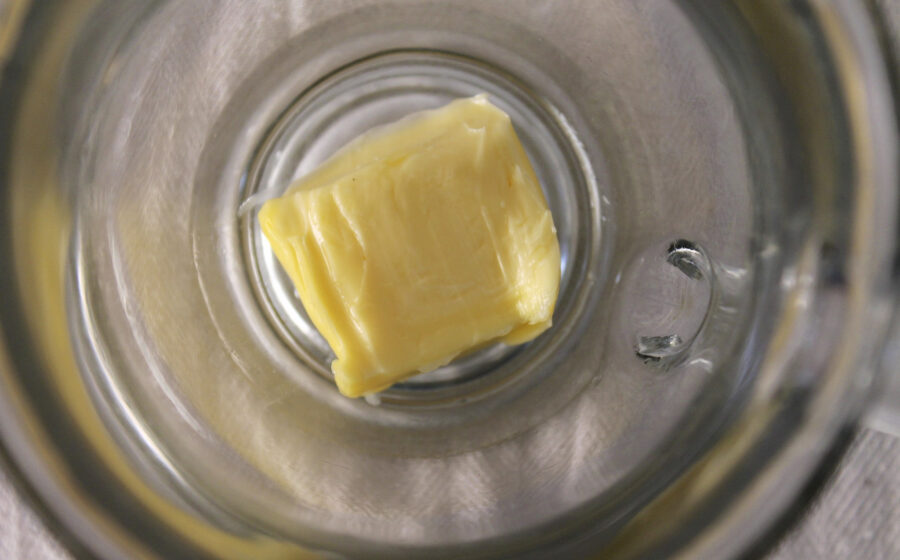[F]or several months now I’ve been fielding questions about butter. At first I rolled my eyes when friends and acquaintances began requesting information on one of coffee’s strangest new trends. “Should I put butter in my coffee?” they asked. “No,” I easily replied. “Of course not.”
But when the inquiries failed to let up, and the trend refused to fizzle out as many others have, I was forced to look a little bit closer at the surprising staying power of Bulletproof Coffee, Silicon Valley executive Dave Asprey’s “bio-hacked” wellness recipe.
Asprey, founder of the Bulletproof Executive brand, is also chairman of the board of the Silicon Valley Health Institute, a nonprofit corporation focused on longevity and anti-aging research. A self-proclaimed bio-hacker, formerly overweight Asprey became fit through, he says, a process of “hacking” into wellness through extensive research. A cornerstone of that journey was his morning beverage.
Asprey first encountered sippable butter in Tibet. After a rejuvenating cup of yak butter-infused tea near Mt. Kailash, he made it his mission to study—to bio-hack, he says—the drink, deducing after several years that a combination of high-grade coffee, grass-fed butter, MCT oil, and coconut oil improves cognition and wires the system to burn fat throughout the day, putting the body in a “high-performance” state. In addition to a list of other supplements, his website sells Bulletproof brand coffee, which is, he says, sourced and formulated to have less toxins than the average beans.
At this point it should be clear that Bulletproof Coffee, and the whole Bulletproof Diet for that matter, and “feeling Bulletproof,” as Asprey puts it, has nothing to do with taste. This isn’t really a coffee fad, it’s a wellness fad. The fact that Bulletproof Coffee has rich creaminess (all that butter) is secondary. Obviously there are a lot of strong declarations attached to Asprey’s Bulletproof way of life and the coffee that fuels it. So, we take it with a grain of salt. (But skip the salted butter. Asprey calls salted coffee “a crime.”)
Silicon Valley is well-known as a petri dish of innovation, and its reputation as a bubble of eccentricity is similarly well-documented, its over-the-top lifestyles regularly skewered on TV shows like Silicon Valley and The Mindy Project. Bulletproof Coffee might be one of the stranger things to rise out of the Valley in awhile—so strange that it is already almost a parody of itself. It feels like something out of SNL or Portlandia. But, maybe because it gives the drinker permission to not only skip breakfast for coffee (Bulletproof Coffee is the anti-oatmeal) but ingest butter without guilt, Asprey’s recipe isn’t unpopular. Not only does it get a lot of press, people are drinking it. A Santa Monica Bulletproof cafe is in the works, slated to open as soon as February.
Naturally, coffee professionals and skeptical nutritionists have been railing against the coffee for sometime. Last week, Gizmodo published an article aiming to break open Bulletproof Coffee. Delving into the science that Asprey evokes but doesn’t elucidate, writer Brent Rose puts Bulletproof’s health claims through the ringer, with particular emphasis on the value, or lack thereof, of Asprey’s high-end, proprietary coffee beans.
Rose states that mycotoxins, the fungus that grows on coffee and is said to be almost eliminated through Asprey’s proprietary coffee process, is also taken care of by wet-processing—a widely used and valued technique in typical coffee production. He also cites a study that suggests that the average coffee drinker, even if ingesting mycotoxins, is always going to be way under what is considered the safe limit.
He also takes the hammer to the brand’s health claims, and Asprey’s other products. Rose questions the safety of the recipe itself, which, when made as Asprey’s recommends it, has levels of oil that Rose calls “excessive.” And he calls into question skipping breakfast—something most nutritionists advise against. As if waiting in the wings for the gauntlet to be thrown, other bloggers took up Rose’s arguments and spread the news of the takedown. The one thing he doesn’t contest? Buttered coffee tastes pretty good.
For coffee professionals, the Bulletproof craze is easy to turn a blind eye to. It’s not in their wheelhouse to dilute mindfully produced, carefully crafted roasts with a proprietary concoction of oils and fats. Even cream and microfoamed milk are accepted by many roasters and baristas with a caveat of “if you must.” And to quote another Silicon Valley figure, there is still something a little “feed your head” about becoming “bulletproof” and entering into the high-performance, lotus position-branded world of Asprey’s product-driven lifestyle.
Like bone broth, another beverage trend adopted from ancestral traditions, drinking butter or ghee is nothing new. There will always be erstwhile, health-conscious drinks that entice the masses with their mystique. Some of them will stick around (kombucha) others will fade away (soy milk). And there will always be a risk to giving credence to these drinks, unless aboard the bandwagon is a place you like to be. Bulletproof Coffee isn’t coffee’s newest trend, the way that new brewing techniques might be scoffed at or embraced. It’s a high-wire act of perception, Rose’s skepticism versus Asprey’s confidence. A self-fulfilling prophecy that puts fats in the spotlight (again). Like all health crazes, its momentum both startles and amazes.
—Regan Crisp is Fresh Cup’s associate editor. She puts milk in her coffee.
















